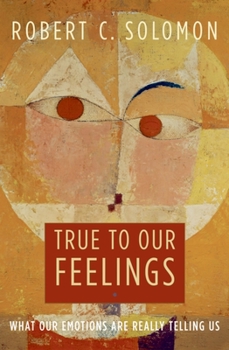True to Our Feelings: What Our Emotions Are Really Telling Us
Select Format
Select Condition 
Book Overview
We live our lives through our emotions, writes Robert Solomon, and it is our emotions that give our lives meaning. What interests or fascinates us, who we love, what angers us, what moves us, what bores us--all of this defines us, gives us character, constitutes who we are. In True to Our Feelings, Solomon illuminates the rich life of the emotions--why we don't really understand them, what they really are, and how they make us human and give meaning to life. Emotions have recently become a highly fashionable area of research in the sciences, with brain imaging uncovering valuable clues as to how we experience our feelings. But while Solomon provides a guide to this cutting-edge research, as well as to what others--philosophers and psychologists--have said on the subject, he also emphasizes the personal and ethical character of our emotions. He shows that emotions are not something that happen to us, nor are they irrational in the literal sense--rather, they are judgements we make about the world, and they are strategies for living in it. Fear, anger, love, guilt, jealousy, compassion--they are all essential to our values, to living happily, healthily, and well. Solomon highlights some of the dramatic ways that emotions fit into our ethics and our sense of the good life, how we can make our emotional lives more coherent with our values and be more "true to our feelings" and cultivate emotional integrity. The story of our lives is the story of our passions. We fall in love, we are gripped by scientific curiosity and religious fervor, we fear death and grieve for others, we humble ourselves in envy, jealousy, and resentment. In this remarkable book, Robert Solomon shares his fascination with the emotions and illuminates our passions in an exciting new way.
Format:Hardcover
Language:English
ISBN:0195306724
ISBN13:9780195306729
Release Date:November 2006
Publisher:Oxford University Press, USA
Length:304 Pages
Weight:1.34 lbs.
Dimensions:1.2" x 9.3" x 6.3"
Customer Reviews
1 rating
Highly Recommended
Published by Thriftbooks.com User , 18 years ago
Background: Robert Solomon, University of Texas, Austin, philosopher in the Anglo-American method and Continental leanings, re-introduced "emotions" or "the passions" into the vocabulary of the theories of mind, particularly with his seminal (and substantially revised) "The Passions: Emotions and Meanings of Life" (1976/1993). He has since written extensively on this subject, including his evolving essays in "Not Passion's Slave: Emotions and Choice" and his superb "Love: Emotion, Myth, and Metaphor." His own "philosophy" that borrows heavily from Continental Thought is "The Joy of Philosophy" which is a true joy to read, re-introducing those topics that are most meaningful in our daily lives (not connotative/denotative, but meaningful). As has been a theme throughout all his writings, our emotions are not a subordinate, but the dominant, feature of our mental lives. Plato and Christianity clearly depreciated the West's understanding and value of these "things" we call variously emotions, passions, feelings, etc. Not until Hume did the passions receive the attention they deserved, only to fall into obscurity again with positivism, analyticity, and ideologies. Solomon resurrected them in the 1970s, and has awakened others (e.g., de Souza, Nussbaum, Davidson, et alia) to an energized interest in these curious "things." Alas, even psychology (yes, psychology) has re-awakened itself to these "oddities" they too had marginalized. This Book: If one is already acquainted with Solomon's other writings, especially those mentioned above, the present one, "True to Our Feelings," will not offer any revelatory insights. If, however, one is new to Solomon, this book is an excellent place to begin one's inquiry into this long-ignored subject, aided by Solomon's articulate writing, keen insights, and devotion to assuring the West that life does have "meanings," those meanings locked-away as "brutish" and "inhuman" by Christianity and others, and the locus of those meanings is indeed in our emotional lives, not in our ratiocinative ones. Using a rhetorical question Solomon posed in "The Passions," he asks the reader to recall from memory the most-meaningful memories, and demonstrates that in each and every instance those meaningful experiences and memories were achieved through our emotions. But before dumping our ratiocinative faculties for our more hedonistic emotions in order to make life all that more meaningful, Solomon insists that the very bifurcation of ratiocinative/appetitive is solely conceptual, not actual. The West's Mistake was to make the conceptual bifurcation actual, and thus deprive humans of their appetitive faculties as "sub-human." So, he's not articulating an either/or dichotomy as has been the dominant paradigm for millennia, he's conjoining them as they properly belong. Lest one think Solomon's endeavor is another philosophical pursuit in obscurantism, I assure the reader he's anything but obscure. If any philosopher has touched "rele






